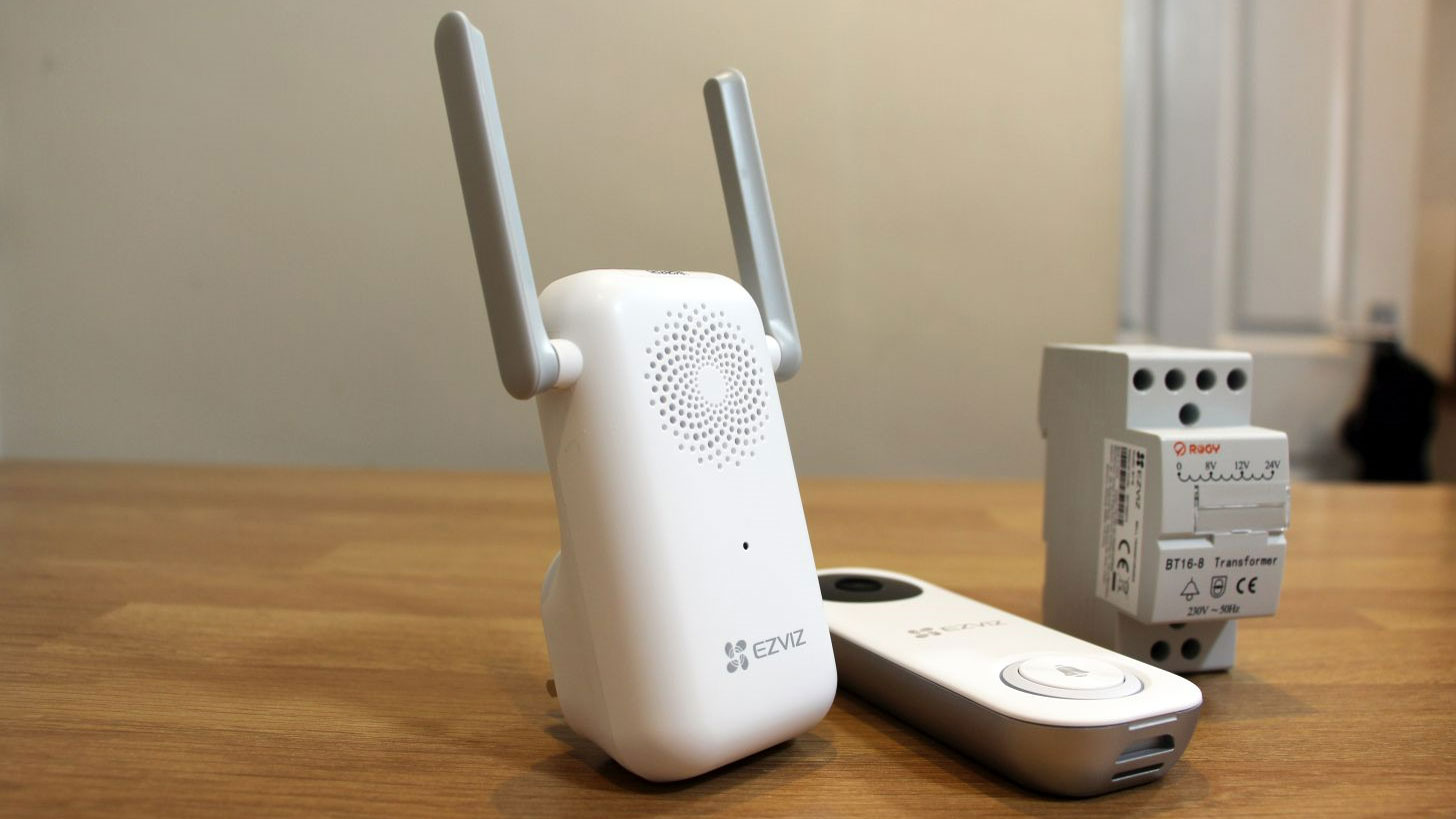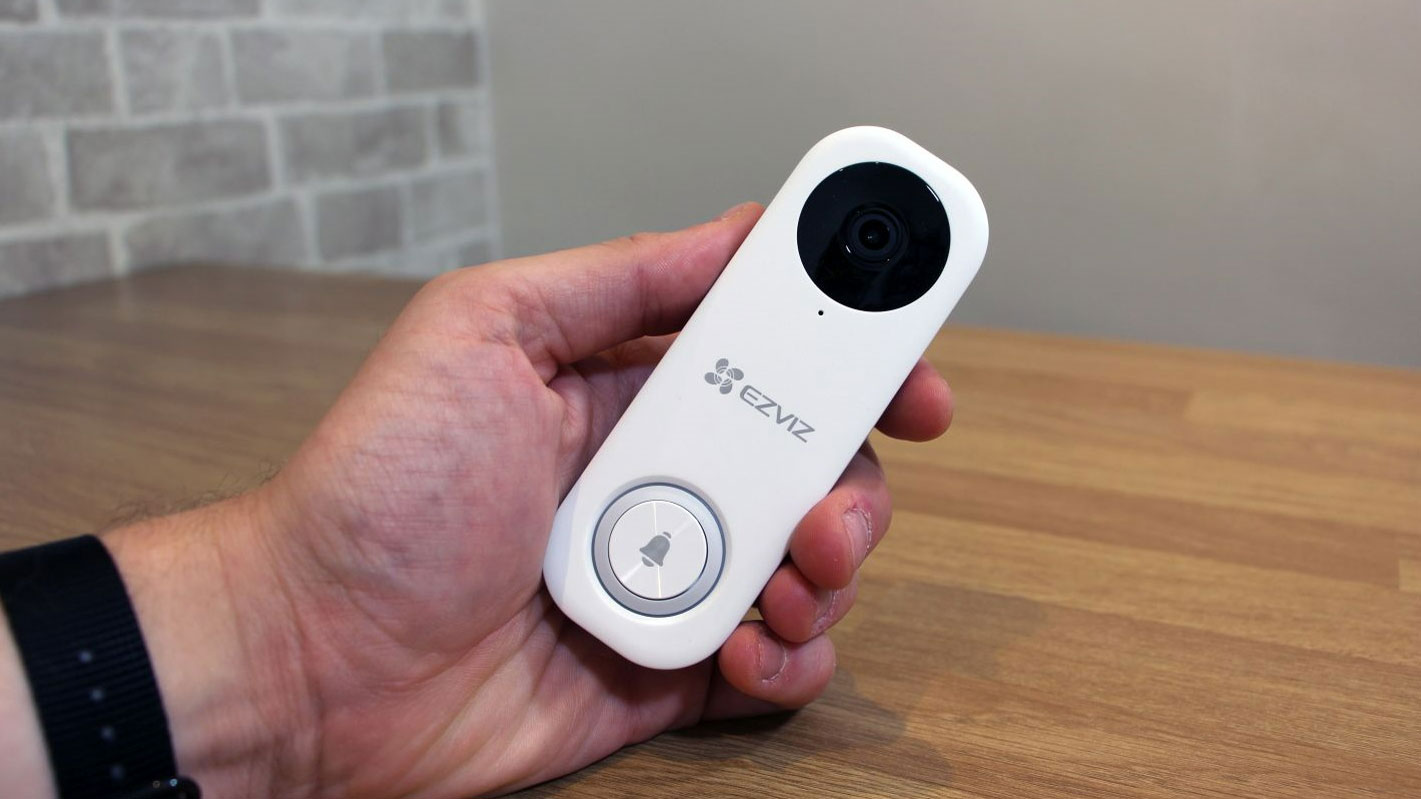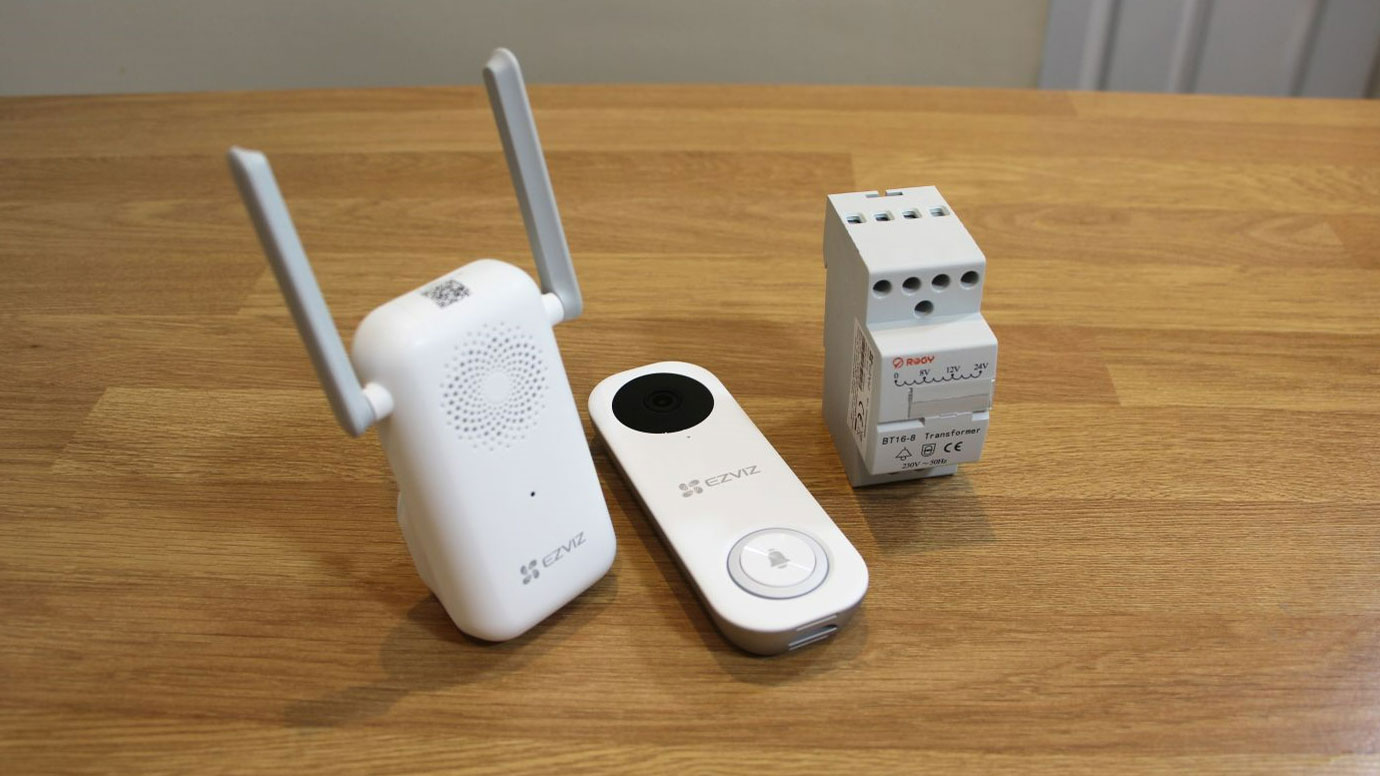More people than ever use video doorbells to improve security and see who’s at their door, but you don’t have to buy a big brand like Ring or spend loads of money to achieve that – as the Ezviz DB1C demonstrates.
Resolution: 1536 x 1536
Camera lens: 170-degrees vertical
Night vision: Yes
Recording options: Local, cloud via subscription
Two-way talk: Yes
WiFi: 2.4GHz/5GHz 802.11n
The Ezviz DB1C deploys a laundry list of impressive features, including a 170-degree vertical field of view, two-way audio and microSD card support. It won’t break the bank, either: in the US the DB1C costs $107 or $140 if you opt for the kit with the chime and transformer. In the UK the updated DB2 costs £100 or £107 if you opt for the full kit.
Those prices compare well to the brand’s biggest rivals: the Ring Video Doorbell 2 costs $99 or £89, but if you want the latest iteration, you’ll have to pay $219 or £179. If you want to invest in Google’s Nest ecosystem, its battery and wired doorbells cost $179/$149 or £166/£229.
We’ve gone hands-on to find out if the Ezviz DB1C can crash the big-brand party and earn a berth on our best video doorbell buying guide – or if you should stick to the more recognizable names.
Ezviz DB1C: Design and build
- Slim and light design, but rivals from Ring and Nest look more modern
- The full kit includes a chime, transformer, and tools
- Lack of battery means you have to hard-wire it to install it
The DB1C’s rounded corners and white casing make it stand out against darker walls, and it’s a pleasingly robust and compact unit – narrower and thinner than the Ring and shorter than Google’s Nest unit. It’s lighter than both, too, and it adheres to IP65, so it’s protected from rain, snow and dust.
The DB1C comes with straight and tilted mounting plates, so you can choose a couple of different angles, and a foam sheet stops the unit itself getting damaged. The plate attaches with a couple of screws, and the camera clips into place.

That sounds simple, but that’s not the end of the installation process. If you buy the DB1C kit you get a chime and transformer, but there are no batteries here – so everything needs wired power, and you’ll have to do that yourself.
If you’re comfortable with wiring that’s fine, especially as the well-appointed kit has everything you need, including a screwdriver and a drill bit. If you want to build a wired camera with maximum versatility, that’s great – but you may have to factor extra installation costs into your budget.
And while there’s no denying that the DB1C looks decent, its rivals are arguably smarter: the Ring has its classic two-tone aesthetic and can be customized with different faceplates and the Nest is pleasingly minimal and futuristic. The DB1C loses out with a huge Ezviz logo that looks a bit outdated.
Ezviz DB1C: Features
- Wide field of view and crisp, high-quality video
- Plenty of software and customization options
- No two-factor authentication and pricey service plans
There’s no denying that this small, lightweight unit can be tricky to install, but it’s got an impressive range of core features once it’s anchored in place.
The DB1C records with a 170-degree vertical field of view, so you can be sure of getting a wide image when you load the camera. Those pictures are crisp, too: the 1536 x 1536 resolution ensures pictures go beyond 1080p in terms of fidelity. The 15fps framerate isn’t the best, but it’s high enough to let you see what’s going on, and owners can switch between standard and fisheye aspect ratios, with the latter offering more detail and a wider field of view.
This unit doesn’t just provide good-quality video. It detects motion – and differentiates between people, cars, animals and other objects. Detection zones are easy to manage, and three infrared cameras deliver effective night vision. It also supports two-way audio.
Delve into the technical details and the DB1C continues to impress. It supports dual-band 802.11n wireless with 128-bit encryption and uses the popular H.264 and H.265 protocols to compress video. It integrates with other smart home systems, including Google Assistant, Amazon Alexa and IFTTT, so it’ll easily fit in with most existing hardware.
This is a good slate of features that broadly matches rivals. Ring’s Video Doorbell 2 has a slightly lower resolution, a smaller field of view and poorer wireless capability, but it fights back with a battery. The pricier Ring Video Doorbell 4 also includes a battery and fixes the older unit’s wireless issue. The Nest is battery-powered and has better wireless ability, although its camera has a poorer resolution.
There’s also the fact that Amazon owns Ring and Google owns Nest. So while the DB1C supports those smart home systems, you’ll get better integration from that hardware.

Ezviz DB1C: Performance
The DB1C has good image and sound quality. The content is accessible using a straightforward and intuitive Android and iOS app. You’ll be familiar with this app if you’ve used any rival software, and the chronological timeline makes it easy to navigate footage and find key moments.
You can easily see your latest alerts and clips, check the status of your doorbell and press a button to turn the camera off. Taking screenshots and changing the aspect ratio are simple. On the bell itself, a ring glows blue when the unit is working normally and red when there’s a problem, and the camera can produce an optional beep if you want to let visitors know they’re being recorded.
Users can create notification schedules – handy if you only want the doorbell to tell you about visitors at a particular time. The only thing really missing here is two-factor authentication, which means rival cameras have more robust security.
Ezviz DB1C: Price
- $107 / £100, or $140 / £107 for the full kit
You’ll also have to consider the storage setup you want to use. If you’d prefer local storage, the DB1C supports 256GB microSD cards. But if you’d like to store videos in the cloud and benefit from unlimited storage or all-day recording, you’ll need to pay for a software plan.
The EVZIZ standard plan costs $6 per month or $60 per year if you want seven days of video storage from one camera, and those prices almost double if you want 30 days of access. If you’d like to use multiple cameras, prices rise again. Prices in the UK are similar.
Ring’s plans support a whopping 180 days of video history and cost $4 per month or $40 per year – and its beefier plans are cheaper than many of the Ezviz equivalents. Nest’s subscriptions offer 30 or 60 days of video history but offer better value than the Ezviz packages.
Ezviz DB1C: User reviews
Plenty of buyers are happy with their DB1C cameras: people enjoy its crisp, colorful pictures and are impressed by the quality of night vision footage. DB1C users are routinely satisfied with the unit’s human detection features and the speed of its notifications.
Elsewhere, users praised the versatility and options available in the Ezviz software – there’s no shortage of customization. People also appreciated the smart, mature and discreet aesthetic design of the DB1C.
As ever, though, not every user was happy. Some people found the software slow, and others found installation difficult on iOS but easier on Android. A handful of people also found that big-brand microSD cards weren’t recognized by the DB1C, so check card support before you buy.
Should you buy the Ezviz DB1C video doorbell?
There’s lots to like about the Ezviz DB1C video doorbell. It delivers good video and sound quality, impressive detection abilities, versatile software and a sleek physical design. Its initial pricing is decent, too – lower than most rival cameras.
This unit does fall down in several key areas, though. Its lack of a battery means it must be hard-wired, which is a tricky job that could add more expense. It doesn’t have two-factor authentication, and its storage plans are relatively expensive.
It’s worth buying the Ezviz DB1C if you need a compact, light video doorbell with affordable start-up costs, but consider other units if you’d prefer a battery-powered unit without wiring or something with lower running costs.
If this product isn’t for you
Ring’s Video Doorbell 2 has easy installation, battery-powered operation and excellent video quality, so it’s ideal if you want a smart doorbell with minimal fuss. Its software is easy to use and works on a chronological timeline, just like the DB1C, and its monthly storage plans are inexpensive. If you’d prefer a straightforward product, this is the one for you.
The newer Ring Video Doorbell 4 is pricier, but it does feature better wireless connectivity, more software options and pre-roll videos of motion events, so it’s a worthwhile choice if your next camera needs to have top connectivity and every feature available. At the other end of the scale, the original Ring Video Doorbell remains affordable and effective.
Google’s Nest has sleek looks and advanced features, from facial recognition to pre-recorded replies. Its video quality is great, and it has a slim, stylish design – but it’s not cheap.

